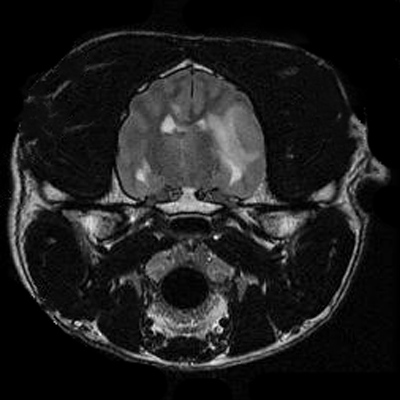 How long does an MRI take?
How long does an MRI take?
An MRI scan usually takes 20-35 minutes. While it is painless, light anesthesia is required to keep your pet completely still during the procedure. Each MRI study is customized to obtain the highest quality images with the least amount of time under anesthesia necessary.
What is contrast used for and is it safe?
Contrast travels through the blood stream and helps to differentiate between normal and abnormal structures. Contrast is safe for veterinary patients, with a very low incidence of side effects. Regardless, each patient is always closely monitored for any potential reactions to the injection.
Who monitors my pet under anesthesia?
Your pet is a member of the family, and our goal is to provide as safe an environment as possible during your pet’s MRI. Before, during, and after the MRI our patients are monitored by certified anesthesia nurses who are specially trained to deal with patients undergoing MRI, and monitor your pet's breathing, heart rate, pulse oxygenation, and blood pressure. Routine blood work and chest X-rays are performed prior to the MRI to minimize the risks associated with anesthesia.
The MRI studies are performed by an experienced, certified MRI tech. This allows us to acquire high quality diagnostic images in as short a time as possible, further minimizing any anesthetic risk. The specialist is also involved in every step of the MRI study including patient positioning, monitoring, study design, and interpretation. We work as a team to provide the highest level of care possible for your pet.
When are MRIs available and how soon can I schedule one?
The MRI center is open for regularly scheduled procedures Monday through Friday. We are also available on an emergency basis on weekends, evenings, and holidays. If your pet is having an emergency, contact your primary veterinarian or the Emergency Service at Pieper Veterinary at (860) 347-8387.
If the doctor feels that an MRI is necessary for your pet, the study can be performed as quickly as the same day of your appointment. Ultimately, scheduling is based on the urgency of the test and your pet’s general health. It is our top priority to have your pet as strong as possible to make them good anesthetic candidates, and routine bloodwork and chest X-rays are performed prior to anesthesia.
Please remember that pets must be fasted for anesthesia. If the MRI is to be performed the same day as your appointment, your pet should not receive any food or water after 10 pm the night prior to your appointment. This is crucial to limit complications such as aspiration pneumonia during anesthesia. If your pet has special needs (e.g., diabetes or renal disease), consult with your primary veterinarian prior to their appointment.
Where are the MRIs performed?
All imaging (including MRI, CT, ultrasound, and digital radiography) is performed on-site in Middletown under the care and guidance of our trained doctors and staff technicians.
When will I have the results of my pet's MRI?
For patients undergoing MRI examination of the nervous system, the neurologist will be able to discuss the results of the MRI the same day to discuss further diagnostic or treatment options. If your pet is undergoing MRI for areas outside the nervous system, you will be able to discuss the results of the exam with the clinician who ordered the test.
How will my veterinarian know what is happening with my pet?
While pets are referred to Pieper due to the advanced diagnostic and treatment options we can offer, your veterinarian is the primary caregiver for your pet - it is crucial that they are involved and informed during the entire process. Your veterinarian will have the ability to view the MRI images online, and you will receive a copy of the MRI results to give to your veterinarian for your pet’s permanent records.
What is non-neuro imaging?
MRI is not only the ideal way to evaluate the nervous system, but it also allows us to look at many different areas of the body with great detail. Areas such as the musculoskeletal system (muscle, ligaments, tendons and bones) and abdominal organs (liver, spleen, and adrenals) can be evaluated with MRI. Non-neuro MR imaging is available by referral. The specialist seeing your pet will be able to order one if necessary and review the results with you. Recent blood work and chest X-rays are required so we can ensure your pet is a good anesthetic candidate.
